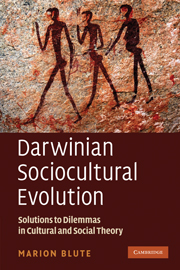Book contents
- Frontmatter
- Contents
- Preface: a postmodern metanarrative
- Acknowledgments
- 1 Introduction
- 2 History: where did something come from?
- 3 Necessity: why did it evolve?
- 4 Competition, conflict and cooperation: why and how do they interact socially?
- 5 The ideal and the material: the role of memes in evolutionary social science
- 6 Micro and macro I: the problem of agency
- 7 Micro and macro II: the problem of subjectivity
- 8 Micro and macro III: the evolution of complexity and the problem of social structure
- 9 Evolutionism and the future of the social sciences
- References
- Index
7 - Micro and macro II: the problem of subjectivity
Published online by Cambridge University Press: 05 June 2012
- Frontmatter
- Contents
- Preface: a postmodern metanarrative
- Acknowledgments
- 1 Introduction
- 2 History: where did something come from?
- 3 Necessity: why did it evolve?
- 4 Competition, conflict and cooperation: why and how do they interact socially?
- 5 The ideal and the material: the role of memes in evolutionary social science
- 6 Micro and macro I: the problem of agency
- 7 Micro and macro II: the problem of subjectivity
- 8 Micro and macro III: the evolution of complexity and the problem of social structure
- 9 Evolutionism and the future of the social sciences
- References
- Index
Summary
SOCIAL CONSTRUCTIONISM/CONSTRUCTIVISM
George Ritzer, in the many editions of his sociological theory texts over the years (e.g. 2000), has argued that an objective–subjective continuum (or what many philosophers prefer to term realism versus relativism) is one of the fundamental dimensions along which theories vary. In recent decades, everything from quarks to schizophrenia to gender has been said in a subjectivist or relativist tone to be “socially constructed”. Debates surrounding social constructionism or constructivism (used interchangeably) seem destined to mark a watershed in the history of cultural and social theory – not unlike the great functionalism debate of the 1960s. Evidence of this historic importance is the widespread attention they been given by philosophers of science. Consequently, in this chapter I have chosen to pay particular attention to the analysis of four major monographs on the topic written by philosophers (Searle, 1995; Sismondo 1996; Hacking 1999; and Ruse 1999) as well as more recent articles (e.g. Mallon 2009) and they are discussed in the appropriate sections of what follows.
Consider first John Searle's The Construction of Social Reality (1995). With respect to the natural sciences and what Searle calls “brute facts” (e.g. the sun is 93 million miles from the earth), he characterizes his position as both ontologically and epistemologically objectivist. He ably defends both realism (the world exists independently of our representations of it) and a correspondence theory of truth (our representations of the world are true if and only if they correspond to the facts in reality).
- Type
- Chapter
- Information
- Darwinian Sociocultural EvolutionSolutions to Dilemmas in Cultural and Social Theory, pp. 162 - 181Publisher: Cambridge University PressPrint publication year: 2010



